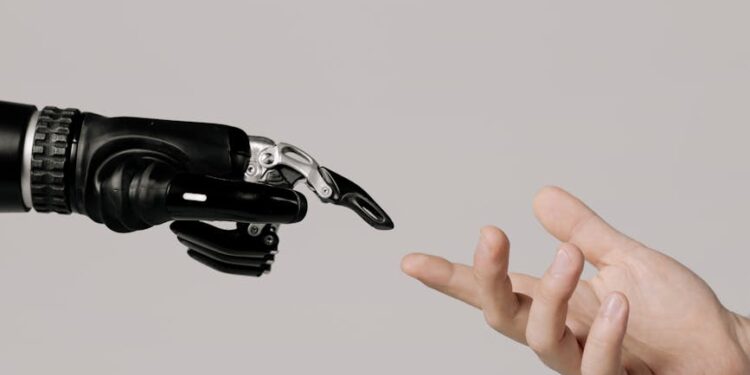The tech world is currently fixated on a singular, transformative vision: artificial intelligence evolving into the ultimate, omnipresent personal assistant. This isn’t merely about voice commands or automated tasks; it represents an aggressive push to deeply integrate AI into every facet of our digital and physical lives, fundamentally reshaping how we interact with our devices, environments, and even information itself. Imagine a future where your technology anticipates your needs, understands your context, and proactively assists you, often before you even realize you require help. This paradigm shift promises unparalleled convenience and efficiency, moving beyond reactive interactions to a truly predictive and personalized digital existence, blurring the lines between user and interface across all connected devices.
The paradigm shift in human-device interaction
For decades, our interactions with technology have been largely reactive. We open an app, type a query, or issue a command, and the device responds. However, the aggressive push for AI as a deeply integrated personal assistant marks a profound departure from this model. Instead of us reaching out to our devices, the AI is designed to reach into our lives, understanding our routines, preferences, and even our emotional states through a tapestry of data points. This shift moves beyond simple task execution, aiming for a system that comprehends context and intent, making interactions feel less like operating a machine and more like collaborating with an incredibly astute partner.
Consider the evolution from a basic search engine to a proactive knowledge assistant. A traditional search engine waits for your typed query. An AI personal assistant, on the other hand, might observe your calendar, recognize that you have an upcoming international trip, and proactively present visa requirements, local weather forecasts, and currency exchange rates, all without a direct prompt. This is achieved through sophisticated natural language processing (NLP), which allows AI to understand nuances in human speech and text, coupled with machine learning algorithms that constantly refine their understanding of individual users and their environments. The goal is to make technology fade into the background, becoming an intuitive extension of our will rather than a tool requiring explicit instruction.
Beyond the smartphone: ai’s pervasive presence
While smartphones have served as the primary nexus for personal AI assistants, the current trajectory sees AI expanding far beyond this single device. The vision of an ultimate personal assistant necessitates a pervasive presence across every digital touchpoint in our lives. This means AI integrated into smart home devices, automobiles, wearables, work productivity suites, and even public infrastructure. Each device becomes a sensor and an output channel for the overarching AI, contributing to a holistic understanding of the user’s context and enabling seamless, continuous assistance.
Imagine your smart home AI adjusting lighting and temperature based on your arrival schedule and mood, your car’s AI optimizing your route based on your calendar and real-time traffic, and your wearable AI prompting you to take a break based on your stress levels and upcoming deadlines. The interconnectedness of these AI-powered devices creates a unified ecosystem where information flows freely, allowing the personal assistant to anticipate needs and offer support irrespective of the device being actively used. This omnipresence ensures that assistance is always available, contextual, and unobtrusive, truly embedding AI into the fabric of daily life.
Personalization at scale: predictive intelligence and proactive assistance
The true power of AI as an ultimate personal assistant lies in its ability to achieve unparalleled personalization through predictive intelligence. This goes beyond merely remembering your preferences; it involves learning patterns, anticipating needs, and offering solutions or information proactively, often before you are consciously aware of the requirement. AI achieves this by analyzing vast amounts of data – your habits, communication patterns, calendar, location, health metrics, and interactions with various services – to construct a dynamic, evolving model of your life.
This predictive capability enables the AI to move from being a reactive tool to a proactive, intelligent agent. For instance, if your AI observes you frequently ordering coffee at a specific time each morning, it might proactively suggest placing an order when you wake up. If your calendar shows a meeting across town, it could pre-emptively calculate travel time based on real-time traffic and suggest when to leave. This level of foresight is what elevates AI from a helpful feature to an indispensable life companion. Below are examples of how proactive assistance can manifest:
| Assistance type | Example scenario | User benefit |
|---|---|---|
| Contextual reminders | “Your flight is delayed by 30 mins, re-routing navigation to the terminal.” | Time efficiency, reduced stress |
| Proactive health monitoring | “Your heart rate has been elevated for 10 minutes; suggesting a brief relaxation exercise.” | Health awareness, preventative action |
| Optimized task management | “Based on your priorities, I’ve rescheduled your morning email check to after your critical meeting.” | Improved focus, workflow efficiency |
| Personalized content curation | “Here are articles and podcasts related to the project you started researching yesterday.” | Enhanced learning, knowledge acquisition |
| Anticipatory purchasing | “Your smart fridge detected low milk; I’ve added it to your grocery list and found a nearby store.” | Convenience, reduced mental load |
Navigating the challenges and the future outlook
While the promise of an ultimate AI personal assistant is compelling, its aggressive integration presents significant challenges that must be thoughtfully addressed. Foremost among these are privacy and data security. For AI to be truly proactive, it requires access to an unprecedented volume of personal data, raising critical questions about how this information is collected, stored, and protected from misuse or breaches. Users must have transparent control over their data and clear understanding of how it is being utilized. Ethical considerations, such as algorithmic bias and the potential for manipulation, also loom large, necessitating robust ethical guidelines and oversight in AI development.
Looking ahead, the development of these deeply integrated AI assistants will continue to prioritize user trust, intuitive interaction, and robust security measures. The focus will shift towards creating AI that not only understands explicit commands but also deciphers subtle cues, learns from complex interactions, and adapts seamlessly to changing circumstances. The future of AI as an ultimate personal assistant is not just about technological advancement; it’s about building intelligent systems that enhance human capabilities, foster greater efficiency, and ultimately, enrich our daily lives, while always maintaining a strong ethical foundation.
Conclusion
The aggressive push for AI to become the ultimate, deeply integrated personal assistant marks a monumental shift in how we envision and interact with technology. As explored, this evolution transcends simple voice commands, moving towards predictive intelligence that anticipates needs, seamlessly integrates across every device, and fundamentally reshapes our daily routines. From personalized health prompts to optimized task management, AI’s omnipresence promises unprecedented convenience and efficiency, creating a truly unified digital existence. However, this transformative power comes with inherent challenges, primarily concerning data privacy, security, and ethical considerations, which developers and users alike must actively navigate. The ultimate success of this paradigm hinges on establishing trust, transparency, and robust safeguards. The future of AI is not merely about smarter machines, but about creating an intuitive, proactive partnership that elevates human potential while maintaining a firm grip on our privacy and agency in an increasingly connected world.



















